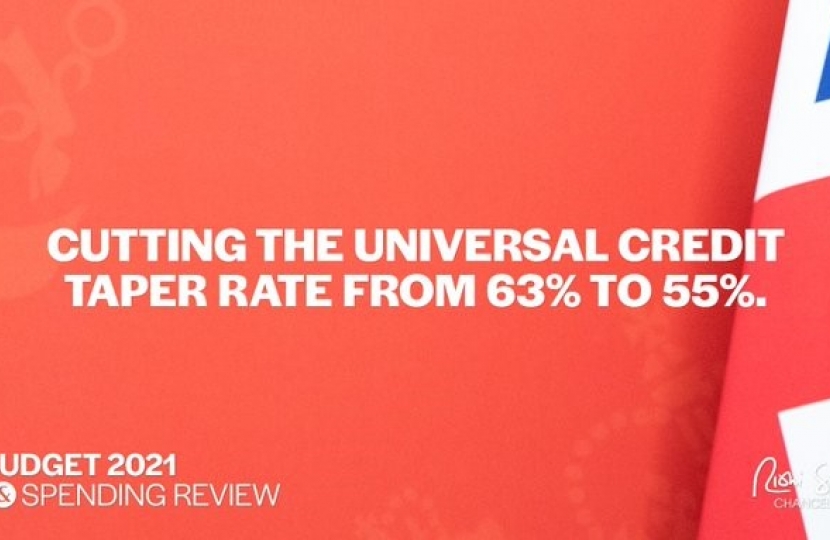
Vale of Clwyd MP Dr James Davies has welcomed the Chancellor’s Autumn Budget.
Speaking in the House of Commons on Wednesday, Rishi Sunak updated MPs on the state of the national finances, growth, inflation and employment predictions for the years ahead. As a result of the unprecedented support introduced by the UK Government throughout the Covid-19 pandemic, UK Growth forecasts are now 6.5%, significantly higher this year than initially planned. Fears of widespread unemployment have also been proved unfounded, as analysis confirmed that peak unemployment will reach 5.2% - down from 12% predicted in July 2020.
In recognition of concerns over the cost of living, a series of policies were announced which will directly assist those workers with the lowest incomes. The National Living Wage will be boosted by 6.6%, up to £9.50 an hour. This increase is set to benefit up to 2 million workers, many of whom will also hold on to more of their money thanks to changes to Universal Credit.
Since February, James has been asking Ministers to re-assess the ‘taper rate’, which reduces Universal Credit entitlement for claimants in work. Today, those efforts paid off, as the Chancellor announced that the rate would fall from 63% to 55%. In practical terms this means that hardworking individuals will be able to keep 8% more of the money which they earn. Work Allowances (the amount that can be earned before the taper takes effect) have also been increased by £500.
Following a period of economic turbulence, and in recognition of increasing wages in the private sector, the Chancellor also announced that over the next review period, the public sector pay freeze will end. The Pay Review bodies are expected to make their usual independent recommendations for each profession in due course.
Rishi Sunak focussed many of his comments on the important role of schools and colleges, as they support young people trying to make up for lost time. Significantly, the Chancellor recognised that educational support will receive additional focus from Government and as such, he announced a £560m numeracy programme to help people develop their mathematical skills – a key skill for many jobs. This new programme will be rolled out across the UK.
As a committed supporter of the ‘Long Live the Local’ campaign, James was delighted to see the simplification of alcohol duties. As part of this process, a Draught Relief will apply to drinks sold on tap within pubs. This cut, worth 5%, is expected to be of primary benefit to pubs, many of which have struggled throughout the pandemic.
More widely, business rates in England are set to be reformed, with a temporary 50% discount for retail, hospitality and leisure premises, more frequent revaluations, and improvement relief for changes to premises. Whilst welcoming these measures, James has stressed the importance that the devolved administration acts to ensure a level playing field for businesses in Wales.
Since his election, James has been working to promote and improve our regional infrastructure. He has therefore welcomed the additional £22.5 million which will be made available to the Union Connectivity Review to develop options for boosting transport links. James has met with the Chair of the Review, Sir Peter Hendy, on multiple occasions and looks forward to further constructive engagement following this announcement.
In addition to transport improvements, the UK Government recognises the significance of reliable broadband for areas such as North Wales. James is engaging with Openreach and Denbighshire County Council to ensure that the local area will benefit from some of the £1.2 billion of funding made available through Project Gigabit.
The Levelling Up Fund was also acknowledged during the Budget Statement and with James’ support, Denbighshire County Council will shortly be submitting their bid to the UK Government for up to £20 million of funding. Promoting and protecting our community is essential; and the commitment to fund 20,000 new police officers, some of whom will work within North Wales was also particularly welcome for all Welsh MPs.
Whilst many of the measures announced by the Chancellor apply throughout the UK, the Devolved Administrations are also set to receive funding through Barnett consequentials. Welsh Government funding is now expected to increase by £2.5 billion each year – the largest real terms block grant since 1998.
In light of recent supply chain concerns, it was announced that the HGV levy, which was initially suspended until August, will not return until at least 2023. This approach complements the range of policies already introduced by the transport secretary, including the use of temporary visas and the freeing of Vehicle Excise Duty. Fuel Duty will also be frozen for the twelfth successive year.
Following the Budget, James said
“This budget delivers for individuals and businesses across North Wales.
“As we look optimistically beyond Covid-19, the Chancellor has delivered policies which will provide tangible benefits for individuals and businesses. Having shown unprecedented financial support during the pandemic, I am delighted that the Government is returning to sensible fiscal management and a renewed focus on Levelling Up. I particularly welcome the additional measures to make work pay, and ensure support for the lower paid at this challenging time.
“I will work in Parliament and locally to ensure that our region receives the maximum possible benefit from each of the schemes outlined today”
